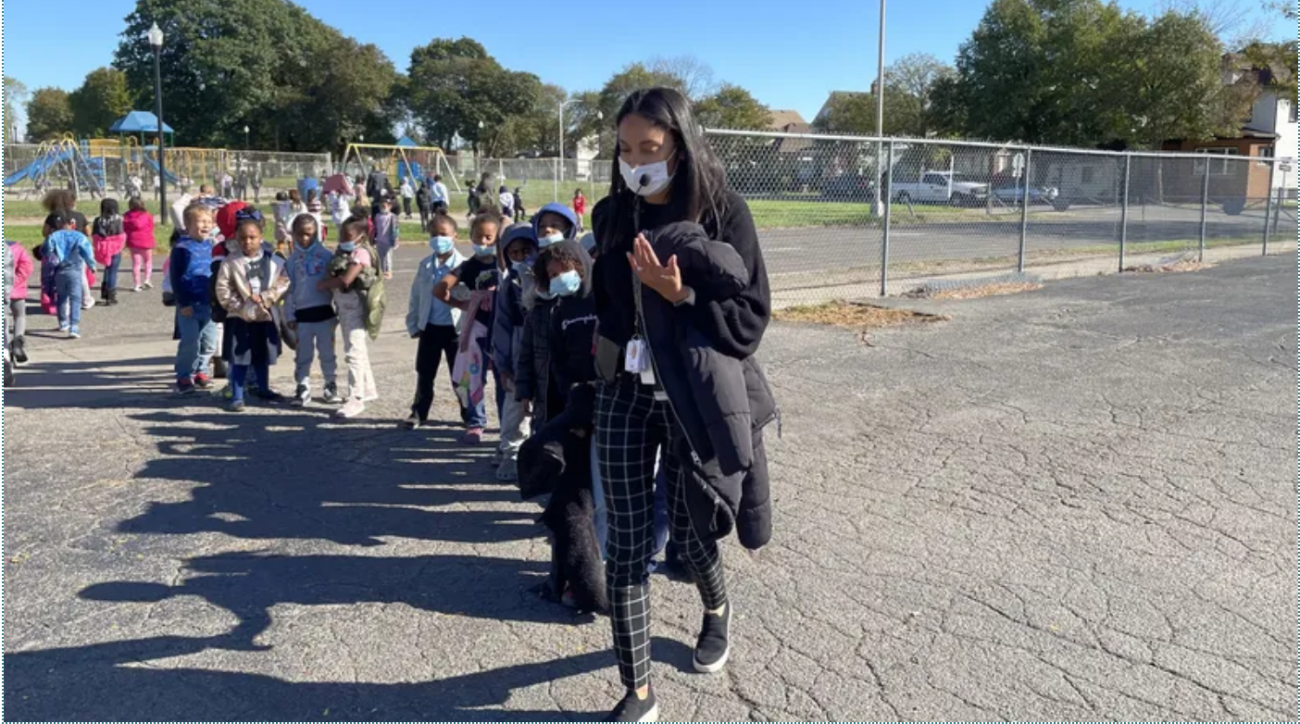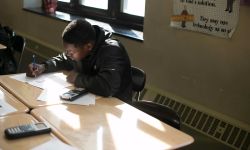Kindergarten catch-up: How teachers are helping young learners

He. Me. An. With. Is.
A hand shot up as soon as the words appeared on the first-grade classroom overhead projector at Ann Visger Preparatory Academy in the Detroit suburb of River Rouge.
“Jorell, you might know these words but we still have to sound them out. Can you do that with us?” teacher Christina Ogle asked.
“Everybody knows those words,” Jorell blurted.
The truth was that some of his classmates couldn’t even name the letters in them.
Related:
- How staff shortages are hurting Michigan students with disabilities
- Black teacher workforce declined sharply as Michigan students left city districts — study
- Few third-graders held back by Michigan’s read-or-flunk law, report finds
While Jorrell attended kindergarten last year, some of his classmates did not. And while schools are relieved that enrollment in early grades has bounced back after last year’s steep drop, first grade teachers in Michigan and across the country are now confronting big differences in their students’ readiness — and working with the children who missed instruction during a critical year for their development.
Kindergarten enrollment was down 11.3 percent across Michigan last year as parents chose to keep their students home rather than face the COVID health risk. In River Rouge it was down 37.2 percent. In some places — Flint, Benton Harbor, Chandler Park Academy, and Old Redford — fewer than half of last year’s would-be public school kindergarteners showed up.
Now, teachers across Michigan — one of 31 states where kindergarten is optional — are working to help them catch up to their peers.
As they entered school this year, parents and administrators had to decide where to place 5-year-olds who didn’t go to kindergarten last year.
Teachers have always had to adapt lessons to meet children’s different needs. But kindergarten and first-grade teachers said this year’s challenges have been more pronounced because some children moved directly into first grade with their peer group while others enrolled in kindergarten a year late.
 (Photo by Tracie Mauriello of Bridge Michigan / Chalkbeat)
(Photo by Tracie Mauriello of Bridge Michigan / Chalkbeat)Overall, 13,593 fewer kindergarten students registered for public traditional and charter schools in Michigan last year compared with 2019-20. Enrollment figures for the current school year aren’t yet available.
Last year’s kindergarten enrollment was particularly low in communities with more Black, Latino, and low-income families, putting already disadvantaged students a year behind their peers.
“Historically, schools have not done a great job of serving minority kids and families, so any time schools are additionally burdened they’re likely to do even less of a good job,” said Amy Parks, professor of early childhood education at Michigan State University.
State enrollment shows students who did not enroll in public school kindergarten weren’t flocking to private schools, either. Private school enrollment increased by less than 1 percent.
Some children may have been taught at home but it’s impossible to know how many because Michigan doesn’t require homeschool registration.
Thousands, though, were unaccounted for last year.
Parents kept their children home last year for a variety of reasons including health concerns and logistic challenges exacerbated by additional burdens families faced during the pandemic, said Walter Cook, a researcher with the Detroit Education Research Partnership at Wayne State University. Researchers there have been analyzing kindergarten enrollment data with The Skillman Foundation, a Detroit philanthropy group whose grantees include Chalkbeat.
Job constraints, lack of childcare, and inadequate internet access were additional obstacles that prevented some parents from providing the time and attention young children need to participate in virtual learning, he said.
‘It’s not play time, nap time, coloring.’
Kindergarten has become more academic, with its increased focus on reading and math readiness. It’s also a grade where children develop interpersonal skills and social behaviors.
“It’s not play time, nap time, coloring. We’re really pushing academics,” said Naja Moore, who teaches kindergarten at Ann Visger Preparatory Academy, the River Rouge school. “The hope is for kindergarteners to be able to read by the end of the year but even if they don’t reach that goal at the end of the year they still get that exposure.”
“If they go to first grade without any kindergarten experience they’re really behind because they’re expected to already know their numbers, already know how to write their name,” Moore said. “If they just go right to first grade they miss that educational foundation.”
For those students, the goal this year is academic growth, not necessarily proficiency, said Nichole German, the Ann Visger principal.
Missing kindergarten could have lasting effects, Cook said.
Detroit Public Schools Community District saw a 25 percent drop in kindergarten enrollment with 3,145 enrolling last year —1,039 fewer students than the year before, pre-pandemic. Kindergarten enrollment in Detroit charter schools was down 20.5 percent.
Most DPSCD students who skipped kindergarten last year went directly to first grade, Superintendent Nikolai Vitti said. Smaller class sizes, expanded after-school programming, and literacy intervention for individuals and small groups will help them catch up, Vitti said.
In Ingham County, Holt schools are extending school days, offering extra instruction during scheduled school breaks, and having kindergarten students begin school with a “soft start” that allows teachers to get to know students before assigning them to classrooms, Superintendent David Hornak said.
“Everything is really hard for her.”
At Ann Visger Academy, Ogle uses a variety of approaches to meet the needs of students who skipped kindergarten. For example, she created two different sets of worksheets for her students.
Most students’ worksheets are geared toward beginner readers. They show, for example, a picture of a mouth and ask children to choose which is correct: “lip” or “lop.” or a picture of a police officer with the words “cop” and “cap.”
Students who missed kindergarten have easier worksheets that ask them, for example, to trace letters.
 (Photo by Tracie Mauriello of Bridge Michigan / Chalkbeat)
(Photo by Tracie Mauriello of Bridge Michigan / Chalkbeat)During independent reading time on a recent Monday, a boy who’d had a full kindergarten year sailed through three books, moving his lips as he read fluently, “It was Friday, and school was out. Froggy flopped home from the school bus — flop flop flop — singing ‘Hurray! Hurray! It’s Friday! Friday!”
Across the room, a classmate put her head on her pile of picture books and cried. It was her third meltdown of the morning. She stayed home last year and isn’t used to being away from her mother, Ogle explained.
Ogle persuaded her to flip through a picture book.
“As of now, that’s what she can do. One of the ways to start reading is to look at the pictures,” Ogle said. “Everything is really hard for her.” She doesn’t have the social, emotional and academic skills of a child who has been through kindergarten, Ogle said.
The differences might have been more pronounced if the children who did attend kindergarten last year had had a normal year, teachers from across the state said in interviews. Instead, they were in and out of school as the severity of the pandemic waxed and waned. Those who attended virtual kindergarten spent the year touching and clicking tablets instead of writing and coloring with pencils and crayons.
“When I introduced an activity that required scissors, my jaw hit the floor watching these kids try to cut,” said Chip Bennett, who teaches first grade at Perry Early Learning Center in Ypsilanti. “They’re holding scissors like they’ve never held a set of scissors in their life, and they might not have.”
Ogle noticed that in River Rouge, too. To sharpen fine motor skills she’s introducing more crafts than in a typical year.
She’s also spending more time than usual on phonics. A typical year begins with a review, but this year, some of her students have had no exposure to letters and their sounds. It’s been difficult, she said, to teach beginning concepts to children who are new to school while keeping more advanced students like Jorell engaged.
“It’s constantly adjusting so they’re not bored. I have to keep that in mind all the time,” she said. “I try to give them something extra to do.”
Parents shouldn’t worry too much, Parks said.
Older children enrolled in kindergarten will have developmental advantages that will carry through their schooling, she said, and those who skip kindergarten have plenty of time to catch up.
Still, she said, districts have to be more flexible in their academic expectations this year.
“First-grade teachers are going to have to spend a little more time on ‘How do we find the bathroom in the classroom?’and ‘What do we do when we want someone’s attention?’ and ‘What does a line mean?’ And it means other things might not happen, and that’s ok,” she said. For example, learning about greater-than and less-than may have to wait for second grade, she said.
“If both educators and families are looking at what kids need, I think we’ll be fine coming out of this,” Parks said.
Chalkbeat is a nonprofit news site covering educational change in public schools.
Michigan Education Watch
Michigan Education Watch is made possible by generous financial support from:
Subscribe to Michigan Education Watch
See what new members are saying about why they donated to Bridge Michigan:
- “In order for this information to be accurate and unbiased it must be underwritten by its readers, not by special interests.” - Larry S.
- “Not many other media sources report on the topics Bridge does.” - Susan B.
- “Your journalism is outstanding and rare these days.” - Mark S.
If you want to ensure the future of nonpartisan, nonprofit Michigan journalism, please become a member today. You, too, will be asked why you donated and maybe we'll feature your quote next time!





